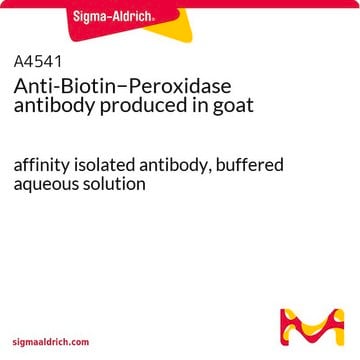F4024
Anti-Biotin–FITC antibody, Mouse monoclonal
clone BN-34, purified from hybridoma cell culture
Sinónimos:
Monoclonal Anti-Biotin
About This Item
Productos recomendados
biological source
mouse
conjugate
FITC conjugate
antibody form
purified from hybridoma cell culture
antibody product type
primary antibodies
clone
BN-34, monoclonal
form
buffered aqueous solution
storage condition
protect from light
technique(s)
immunohistochemistry (formalin-fixed, paraffin-embedded sections): 1:80
isotype
IgG1
shipped in
dry ice
storage temp.
−20°C
target post-translational modification
unmodified
¿Está buscando productos similares? Visita Guía de comparación de productos
General description
Immunogen
Application
In some applications, localization of biotinylated probes with avidin produces high background levels. Anti-biotin reagents may be substituted for avidin to decrease non-specific binding.
Biochem/physiol Actions
Physical form
Disclaimer
¿No encuentra el producto adecuado?
Pruebe nuestro Herramienta de selección de productos.
Storage Class
10 - Combustible liquids
wgk_germany
nwg
flash_point_f
Not applicable
flash_point_c
Not applicable
ppe
Eyeshields, Gloves, multi-purpose combination respirator cartridge (US)
Certificados de análisis (COA)
Busque Certificados de análisis (COA) introduciendo el número de lote del producto. Los números de lote se encuentran en la etiqueta del producto después de las palabras «Lot» o «Batch»
¿Ya tiene este producto?
Encuentre la documentación para los productos que ha comprado recientemente en la Biblioteca de documentos.
Los clientes también vieron
Nuestro equipo de científicos tiene experiencia en todas las áreas de investigación: Ciencias de la vida, Ciencia de los materiales, Síntesis química, Cromatografía, Analítica y muchas otras.
Póngase en contacto con el Servicio técnico









